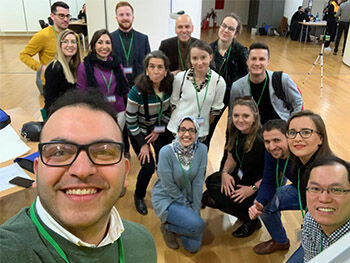PhD students travel to Greece for sustainability competition

Five PhD students visited Greece recently to take part in a hack that sought to find new ideas for sustainable travel.
Andreea Blaga, AlaaAllah ElSabaa, Hsein Ping Kew, Mohammad Nour Albarini and John Hayes – all from the Faculty of Computing, Engineering and Built Environment (CEBE) – represented Birmingham City University at the event. Taking place at the Aristotle University of Thessaloniki, postgraduate researchers from a number of European institutions were also present.
Improving sustainability and tourism
The hack’s premise involved collaborating on ideas to improve tourism to Greece, specifically Thessaloniki. The participants were divided into teams of six, working to create concepts that would be pitched in front of a jury.
“The hack was unique in how it brought together people from different backgrounds and disciplines,” says AlaaAllah. “The teams were very diverse in thoughts and capabilities. Witnessing those varying thoughts being discussed and thus forming one idea for the team was inspiring and magical in its own way.”
Presenting business concepts
With sustainability also a core focus of the hack, the teams pitched ideas that would have benefits to the environment as well as tourism.
Andreea’s idea involved small agricultural businesses offering tailor-made experiences for tourists. “The benefits to this would be two-fold,” Andreea explains. “Small businesses can advertise more frequently, boosting their income, while also improving economic and general growth in Greece.”
After finalising a business plan, the teams had to give a seven-minute presentation to a jury of local and international stakeholders. The winning team received sponsorship to present their work at the Global Innovation Fest in Madrid.
A global research meet
With four European universities involved, as well as PhD students from across the globe, the hack gave the CEBE researchers the chance to engage with many different cultures.
“The hack enabled us to connect with international researchers,” Andreea says. “Meeting people from different countries and research backgrounds, and getting to work with them on a real-world challenge, was an interesting and exciting opportunity.”